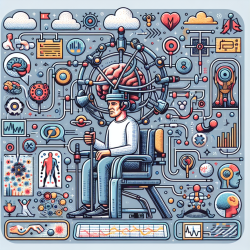Introduction
In the realm of stroke rehabilitation, the ability to accurately identify and target dysfunctional brain tissue can significantly enhance therapeutic outcomes. The research article "MEG-based detection and localization of perilesional dysfunction in chronic stroke" offers compelling insights into how Magnetoencephalography (MEG) can be utilized to detect and localize perilesional dysfunction in chronic stroke patients. This blog aims to distill the key findings from this study and explore how speech-language pathologists and other practitioners can leverage these insights to improve patient outcomes.
Understanding Perilesional Dysfunction
Perilesional dysfunction refers to the impaired function of brain tissue surrounding a stroke-induced lesion. This dysfunction is not solely due to structural damage but also involves electrophysiological abnormalities. The study highlights that perilesional tissue exhibits a slowing of the power spectrum, characterized by increased delta and theta power and decreased beta power, alongside reduced multiscale entropy (MSE).
MEG as a Diagnostic Tool
MEG provides a non-invasive means to measure brain activity with high temporal resolution. By employing beamformer-based reconstruction of signals, the study was able to compare spectral and nonlinear measures of electrical activity in both perilesional and healthy cortices. This approach allows for the precise localization of dysfunctional tissue, which is crucial for targeted interventions.
Implications for Therapy
The findings suggest that MEG can be a valuable tool in identifying ideal targets for non-invasive brain stimulation therapies, such as transcranial magnetic stimulation (TMS) and transcranial direct current stimulation (tDCS). By focusing on areas with reduced MSE and altered spectral power, therapists can potentially enhance the efficacy of these interventions.
Encouraging Further Research
While the study provides a robust framework for identifying perilesional dysfunction, it also opens avenues for further research. Practitioners are encouraged to explore the integration of MEG with other imaging modalities, such as MRI, to better understand the underlying mechanisms of perilesional dysfunction. Additionally, longitudinal studies could provide insights into how these electrophysiological markers evolve over time and in response to therapy.
Conclusion
By incorporating MEG-based assessments into clinical practice, speech-language pathologists and rehabilitation specialists can make more informed, data-driven decisions. This approach not only enhances the precision of interventions but also contributes to the broader goal of improving long-term outcomes for stroke patients.
To read the original research paper, please follow this link: MEG-based detection and localization of perilesional dysfunction in chronic stroke.










